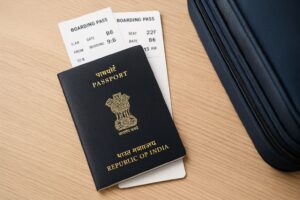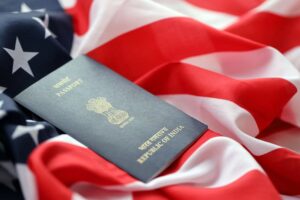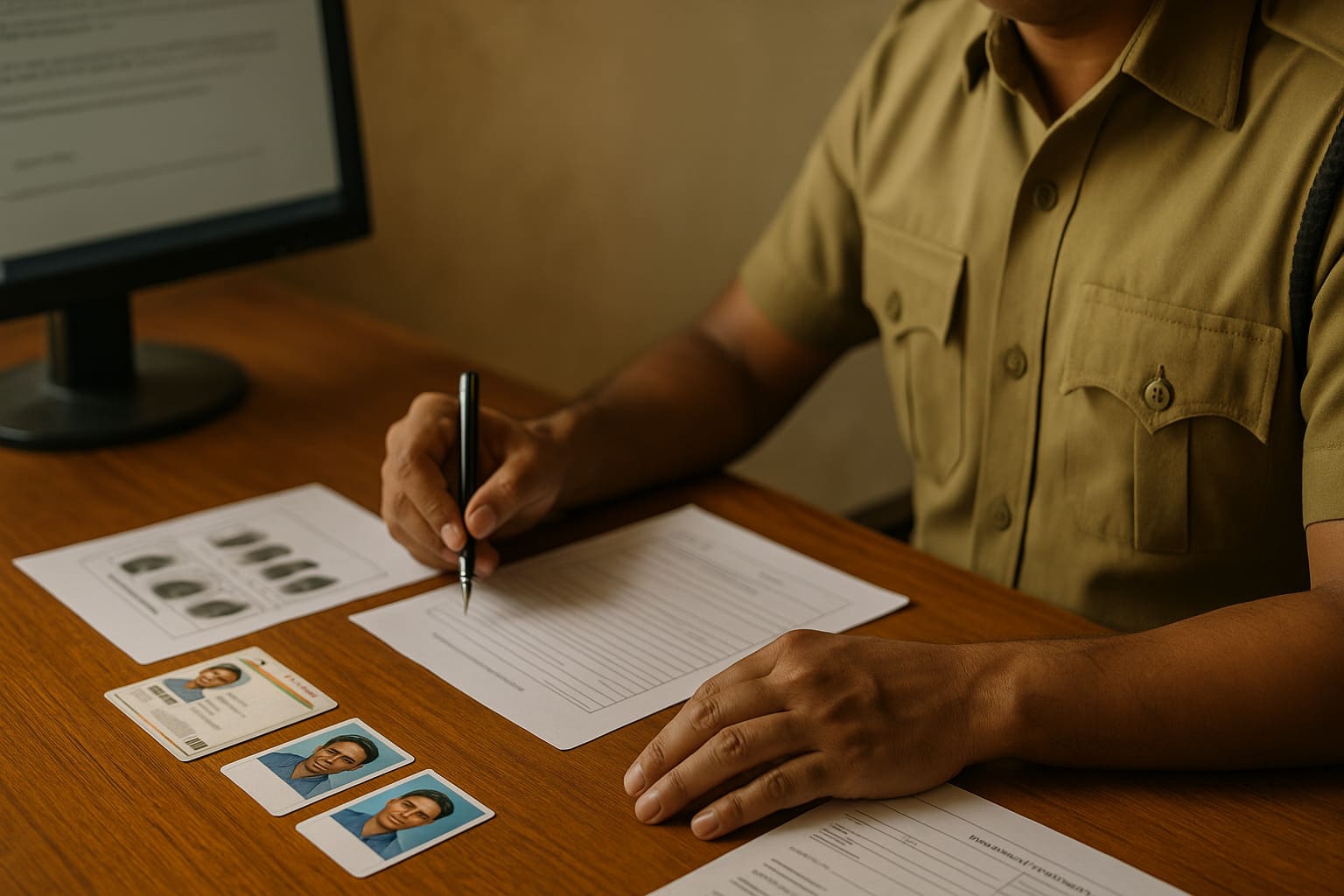
Police Verification for Passport in India is a simple check by the local police to confirm your identity and address before issuing your passport.
It is an essential step in the passport application process, as the Passport Seva Kendra (PSK) and Regional Passport Office (RPO) must ensure that your details are correct and genuine.
During police verification, a verification officer visits your home to personally check your address and identity documents, then submits a Police Verification Report (PVR) based on their findings.
Normally, police verification for passport in India takes around 10-15 days, but if your documents are incomplete or incorrect, it may cause passport issuance delays.
You can easily track the verification status online using your Application Reference Number (ARN). Understanding the full police verification procedure, including timelines, required documents, and common issues, helps you complete your Indian passport application smoothly without delays.
Need Expert Help on Your Passport Application?
Our passport agents handle forms, documents, and just one call away..
What is Police Verification for Passport?
Police Verification for Passport is a necessary step in every Indian Passport Application. It is a type of passport police check done by local police to make sure that the details given by the passport applicant are true.
A verification officer from your area visits your home to carefully check your identity proof and address proof documents. This home visit by police helps confirm your identity clearly.
The Passport Seva Kendra (PSK) and the Regional Passport Office (RPO) depend heavily on the Police Verification Report (PVR) to avoid fake identities and incorrect addresses. Police verification for passports make sure only genuine applicants receive passports.
Sometimes the process happens before issuing the passport (Pre Police Verification), after passport issuance (Post Police Verification), or in a few special cases, there is no verification required at all. Accurate police verification directly affects passport approvals and prevents delays.
The full passport verification process starts when your application moves from the PSK to the police office.
Why is a Police Verification Required for Passport?
Police verification for passport is done to make sure the applicant has no criminal background. It helps stop fake identity use and confirms that the person is safe to receive an Indian passport. The officer checks if all personal details are true and updates the Police Verification Report (PVR).
This process blocks passport fraud, stops identity theft, and avoids giving passports to the wrong people. It ensures only genuine passport holders are approved by the Regional Passport Office (RPO).
Police checks also support national security measures. By doing a full criminal background check, officers reduce misuse of passports during international travel. This step is important in keeping the passport system safe, clean, and trusted.
Types of Police Verification in Indian Passport Process
Every Indian passport application follows a fixed verification category based on the purpose and paperwork. This category decides how your Application Reference Number (ARN) moves forward, when the Police Verification Report (PVR) is completed, and how the Regional Passport Office (RPO) clears your passport for printing.
Pre Police Verification
This is used for most new applications. After your biometric is done at Passport Seva Kendra (PSK), the review stays on hold.
The local police station receives the request, and a Verification Officer is assigned. The officer checks your identity proof, current residential address, and may talk to neighbours. If the name is mismatched, or address is unclear, the report is flagged.
Your PVR stays pending until everything matches. The RPO holds the approval until this verification is marked clear.
Post Police Verification
In some cases, the passport is approved and sent for printing before police verification starts.
This usually happens in renewals or when the application already shows strong supporting records.
After the ARN is submitted, the police report is requested by the system. A visit may still happen. If the officer finds anything off — like unverified stay, or address doubts — the RPO may hold or cancel the printed passport.
Even here, PVR tracking matters. A clear report closes the case. A negative one pauses the approval or pulls the passport back.
No Police Verification Required
Some applicants qualify for a direct approval without any visit. This includes Central Government employees who submit Annexure F, and children with proper birth records.
In these cases, no Verification Officer Visit is sent. The PSK forwards the application, and the RPO finalises it after matching all documents.
No Police Verification Report is raised. This only works if identity, address, and age proof are perfectly aligned.
A mismatch in category can delay your ARN movement or stop your passport from printing. After biometric, always check your application status to confirm whether the verification has been completed or still pending.
Online Passport Police Verification Process
When your passport application is submitted at the Passport Seva Kendra (PSK), an Application Reference Number (ARN) is created. This ARN is linked to your identity and becomes your tracking code.
If your case qualifies for online police verification, the system forwards your ARN digitally to the Superintendent of Police (SP) Office. No physical documents move at this stage.
The SP Office checks your application, confirms your identity proof and address proof, and uploads the Police Verification Report (PVR) through the internal portal.
Once uploaded, the Regional Passport Office (RPO) reads the digital report and takes the final action—approval, hold, or review. You can track every movement of your ARN on the Passport Seva Portal. This online workflow avoids courier delays and reduces errors in paper handling.
Offline Passport Police Verification Process
Some passport applications need field-level verification. This is common in new applications, low-document cases, or if the RPO requests physical confirmation.
After ARN creation, your application is sent from the SP Office to the local police station that covers your area. A Verification Officer is appointed to carry out a home visit.
The officer either calls or arrives at your current residential address. Your identity proof and address documents are reviewed in person. In most cases, the officer also asks neighbours to confirm your stay.
If you are not available during the visit, the officer may note the absence and return later. Some officers also take photos of nameplates or house markers to confirm address identity.
After this, the officer writes the PVR manually and returns it to the local police HQ. From there, it is passed to the RPO for a final decision.
This offline police verification takes more time but ensures the application is cleared after full ground inspection.
Documents Required for Passport Police Verification in India
Police verification works only when the right documents are shown. The Verification Officer Visit depends on what you hand over. If originals are missing or names mismatch, the Police Verification Report (PVR) may get delayed or even rejected.
Main Identity Proofs:
Always carry at least one strong identity proof. These are checked in person during the visit. The officer may also note the number and photo for the final record.
- Aadhaar card with correct photo and updated details
- PAN card (for identity only, not address)
- Voter ID with full name and clear photo
Address Proofs:
Your current residential address must match what you submitted at the Passport Seva Kendra (PSK). This is what the Verification Officer confirms during the house visit.
- Electricity bill, bank passbook, or rental agreement (must match current stay)
- Joint utility bill with relationship proof if address is not in your name
- Updated Aadhaar with correct local address
Supporting Documents (if applicable):
Sometimes, additional supporting documents avoid long delays. These are not always asked for, but help during verification.
- Annexure F for Central Government employees
- Birth certificate for minors or to confirm date of birth
- Name change affidavit or Gazette copy for changed names
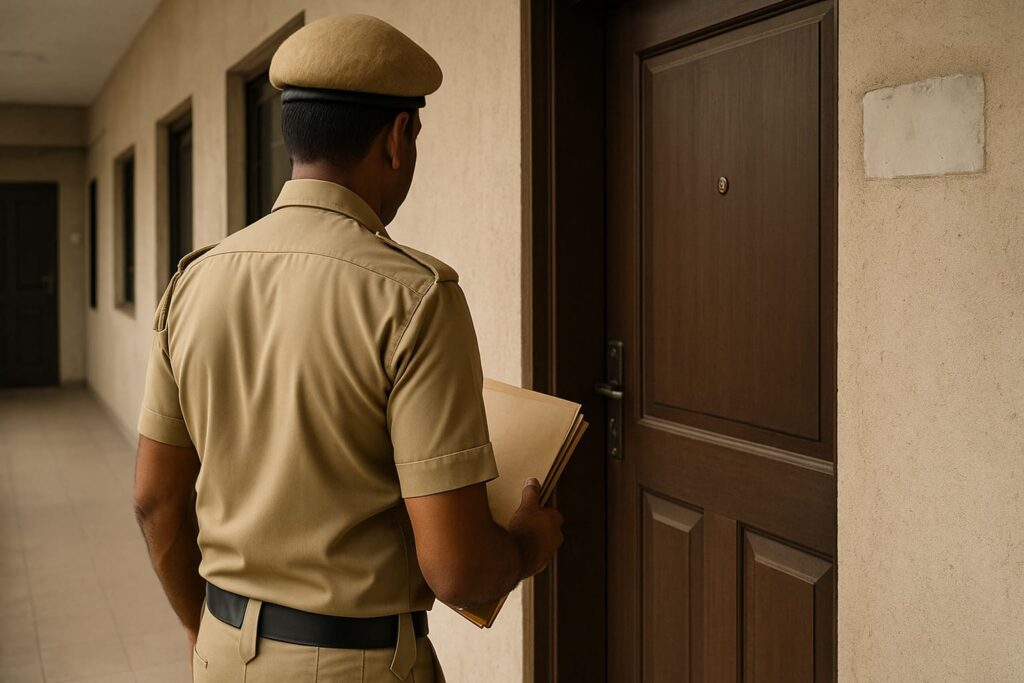
How Police Verification for Passport Happens Step by Step
The Verification Officer Visit is a core part of passport police verification. It confirms you live where you claimed. This short visit decides how fast your Police Verification Report (PVR) clears. Here’s what usually happens:
Step 1: Officer gets your ARN from local police station
Your Application Reference Number (ARN), created at the Passport Seva Kendra (PSK), reaches the local police station. A Verification Officer is appointed to check your details in person.
Step 2: Officer arrives at your registered address
The officer may call ahead or arrive directly at your address. You will be asked to show your Aadhaar card, PAN card, or Voter ID for identity confirmation.
Step 3: Identity proof and address documents are verified
You must show both originals and photocopies of your identity proof and address documents. If the name, photo, or address does not match the application, it may lead to a mismatch delay.
Step 4: Officer asks simple personal details
The officer asks simple questions like how long you have lived there, who lives with you, and what work or study you do. These answers help confirm residential status.
Step 5: Neighbour confirmation
One or two neighbours may be asked to confirm that you live at the address. This is called neighbour feedback, and it is added to the PVR report.
Step 6: Officer notes physical details of your home
The officer notes the nameplate, house number, or may click a photo. If your address lacks visible markers or is hard to confirm, they might revisit.
Step 7: Officer fills the report manually
After the check, the officer writes the Police Verification Report manually or digitally. It is submitted to the SP Office, then forwarded to the Regional Passport Office (RPO) for final approval.
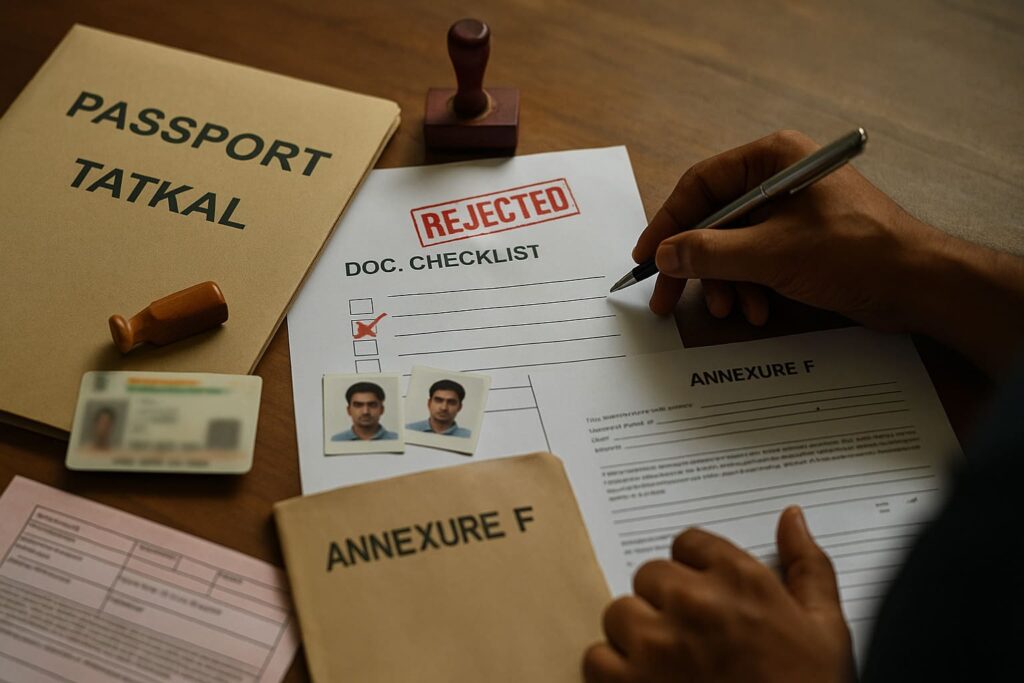
Police Verification Process for Tatkaal Passport
A Tatkaal Passport Application is for urgent travel needs. The biggest difference is the timing of the Police Verification Report (PVR). In Tatkaal, the passport is often issued first. Then comes Post Police Verification, where a Verification Officer Visit may still happen after delivery.
This fast-track flow works because the Regional Passport Office (RPO) trusts strong documents. They check everything during your PSK appointment, then send the case to the SP Office. If the report is clean, your passport stays valid. If not, the RPO can hold or cancel it later.
You do not need police clearance before getting your Tatkaal passport. But the officer can still visit your home within 7–10 days. Keep all documents ready, just like in regular checks.
Extra Documents Required for Tatkaal Passport
- Annexure F signed by a Gazetted Officer (for Central Govt staff)
- Verification Certificate (VC) with official seal (for urgent approval)
- Current identity proof like Aadhaar, PAN, or Voter ID
- Updated address proof matching your application
- Supporting documents like job letter, travel ticket, or bonafide certificate
Make sure all documents are real, valid, and easy to read. A document mismatch can delay the Post Police Verification.
How Much Time Does Police Verification for Passport Take?
In most cases, passport police verification takes 10 to 15 working days. The exact time depends on your current address, how quickly the Verification Officer Visit happens, and how soon the Police Verification Report (PVR) is sent to the Regional Passport Office (RPO).
Normal Passport Police Verification Timeline
After your PSK appointment, your file goes to the SP Office. The officer visits your home to complete address confirmation and check your identity proof. If everything is clear, the report reaches the RPO within 10 to 15 days. Then the passport moves ahead.
Tatkaal Passport Police Timeline
In a Tatkaal Passport Application, the passport is issued first. Then Post Police Verification happens. The officer may still visit your home after delivery. If the PVR shows a problem, the passport can be held or cancelled. The full check usually takes 5 to 10 days, but the travel document is already printed.
Why Delays Happen in Police Verification
- You are not at home during the visit
- Address mismatch between form and ID
- Officer can’t find the house easily
- Blurred documents or incomplete proof
- No neighbour available to confirm stay
- Mismatch delay from Aadhaar or school records
How to Track Your Police Verification
Use your Application Reference Number (ARN) on the Passport Seva Portal to check status. If it says Verification Pending, it means the officer has not yet updated the result. Once the PVR is uploaded, you will see clear updates like Review Under Process or Clear.
Common Problems During Passport Police Verification
Even if your passport application is strong, police verification can go wrong because of small mismatches, delays, or missed steps. Below are real reasons why applicants get stuck or rejected:
- Verification Officer Visit does not happen for many days
- Address mismatch between Aadhaar and form details
- Neighbour confirmation missing during field verification step
- Identity proof has blurred photo or wrong name
- Police Verification Report (PVR) sent back with comments
- Status stuck at SP Office with no officer update
- Application shows Not at Home when officer visited
- Supporting documents not matching official records properly
- Regional Passport Office (RPO) holds file after PVR issues
- Verification pending due to document mismatch or confusion
If any of these happen, your next step is to track the status using your Application Reference Number (ARN) on the Passport Seva Portal, and then visit the local police station or contact your Regional Passport Office (RPO) for support.
Still Confused About the Process? Talk to a Passport Agent Today
Expert Tips to Easily Pass Police Verification
Small mistakes delay passport approval. These tips help you prepare better for the Verification Officer Visit and clear your Police Verification Report (PVR) on time.
What to Carry During Verification
- Carry original Aadhaar card and one clear photocopy
- Keep 2–3 documents as backup address proof
- Ensure all papers match details on your passport form
- Print PSK receipt and your Application Reference Number (ARN)
How to Speak and Handle the Visit
- Answer politely and use simple, respectful language
- Do not argue or rush the Verification Officer
- Ask one neighbour to confirm your stay in advance
- Keep house nameplate or flat number clearly visible
Mistakes That Block Your Passport
- Wrong identity proof or mismatched documents shown
- No one home during field verification visit
- Address hard to locate or building not clearly marked
- Signature missing on Annexure F or unclear photocopy
These basic steps can help avoid document mismatch, delay, or negative police verification. If in doubt, call your local PSK or visit the Regional Passport Office (RPO) to clarify before the officer arrives.
 Passport Guide
Passport Guide